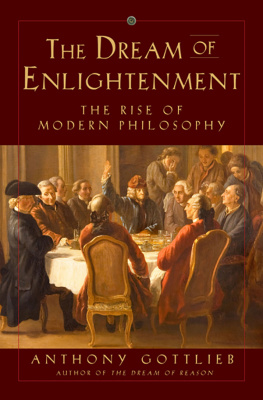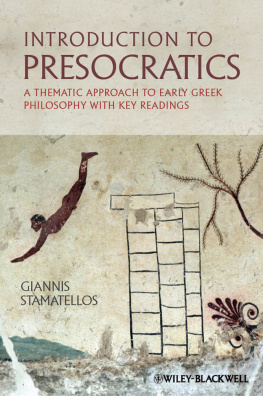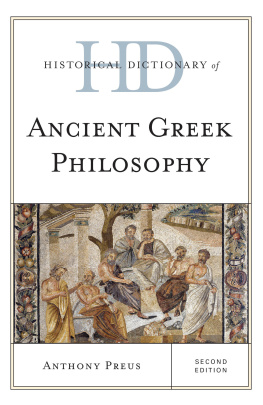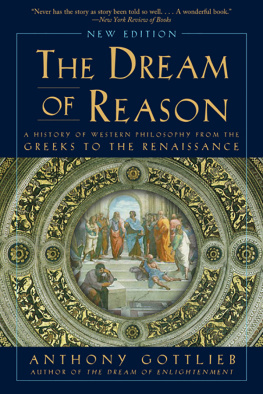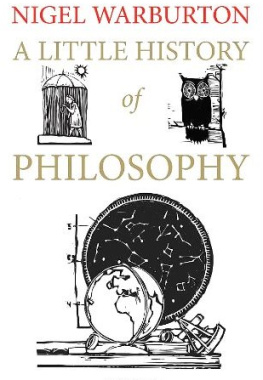W. W. Norton & Company
For information about permission to reproduce selections from this book, write to Permissions, W. W. Norton & Company, Inc., 500 Fifth Avenue, New York, NY 10110
Gottlieb, Anthony.
The dream of reason: a history of western philosophy from the Greeks to the Renaissance / Anthony Gottlieb.
p. cm.
Includes bibliographical references.
ISBN: 978-0-393-04951-0
1. PhilosophyHistory. I. Title.
W. W. Norton & Company, Inc. 500 Fifth Avenue, New York, N.Y. 10110
www.wwnorton.com
W. W. Norton & Company Ltd., 10 Coptic Street, London WC1A 1PU
Introduction
The last thing I expected to find when I began work on this book, more than ten years ago, is that there is no such thing as philosophy. Yet that, more or less, is what I did find, and it explained a lot. Determined to forget what I thought I knew, I set out to look at the writings of those from the past 2,600 years who are regarded as the great philosophers of the West. My aim (politely described by friends as ambitious when they often meant mad) was to approach the story of philosophy as a journalist ought to: to rely only on primary sources, wherever they still existed; to question everything that had become conventional wisdom; and, above all, to try and explain it all as clearly as I could.
As I ploughed through the diverse cast of characters from the fifth and sixth centuries BC who are traditionally lumped together as philosophers, through Socrates, Plato, Aristotle (often bracketed as a trio, but were there ever three more different men?), on to the intellectual therapists of Hellenistic times, through the mystics and occultists of late antiquity, to the first Christian thinkers, the logic-obsessed monks of the early Middle Ages, medieval scientists and theologians, Renaissance magicians, visionaries, grammarians and engineers and on to the beginnings of modern times, the fabric of philosophysupposedly the oldest of subjectsunravelled before my eyes. Traditional histories, which seek to distinguish it from the physical, mathematical and social sciences, and from the humanities, had drastically over-simplified, I concluded. It was just not possible to confine what is usually referred to as philosophy to a single subject that can be placed neatly on the academic map.
One reason for this is that the place-names on such maps tend to change. In the Middle Ages, for instance, philosophy covered practically every branch of theoretical knowledge that did not come under theology. Newtons subject was natural philosophy, a term that was still widely used in the first half of the nineteenth century to cover most of what we now regard as science and some of what we now think of as philosophy. What has been called philosophical thinking is naturally inclined to stray across conventional boundaries. Its wanderlust and insatiable curiosity have often given birth to new areas of thought, which again complicates the task of map-drawing. As we shall see in the first chapter, Western science was created when a few Greek thinkersthose who are known as the first philosopherswere perverse enough to ignore the usual talk of gods and to look instead for natural causes of events. Much later on, psychology, sociology and economics came about largely from the work of people who at the time were called philosophers. And the same process of creation continues today. Computer languages, for example, stem from what was long regarded as the most tedious invention of philosophers, namely formal logic. A small but typical example of how philosophy sends out new shoots is to be found in the case of Georg Cantor, a nineteenth-century German mathematician. His research on the subject of infinity was at first written off by his scientific colleagues as mere philosophy because it seemed so bizarre, abstract and pointless. Now it is taught in schools under the name of set-theory.
The fact is that the history of philosophy is more the history of a sharply inquisitive cast of mind than the history of a sharply defined discipline. The traditional image of it as a sort of meditative science of pure thought, strangely cut off from other subjects, is largely a trick of the historical light. The illusion is created by the way we look at the past, and in particular by the way in which knowledge tends to be labelled, chopped up and re-labelled. Philosophical work is regularly spirited away and adopted by other disciplines. Yesterdays moral philosophy becomes tomorrows jurisprudence or welfare economics; yesterdays philosophy of mind becomes tomorrows cognitive science. And the road runs in both directions: new inquiries in other disciplines prompt new questions for the philosophically curious. Tomorrows economics will be meat for the moral philosophers of the day after. One effect of these shifting boundaries is that philosophical thinking can easily seem to be unusually useless, even for an intellectual enterprise. This is largely because any corner of it that comes generally to be regarded as useful soon ceases to be called philosophy. Hence the illusory appearance that philosophers never make progress.
The psychologist William James once described philosophy as a peculiarly stubborn effort to think clearly. This is a rather dry definition, but is more nearly right than any other I know. True, clarity is not exactly the first thing that comes to mind when most people think of philosophy. There is no denying that philosophers attempts to think clearly have often rudely backfired. (Any subject that is responsible for producing Heidegger, for example, owes the world an apology.) Still, William James was right to describe philosophy as he did. Even the darkest of its practitioners are struggling to make sense of things, and it is this effort that makes them philosophers. Sometimes the effort does not pay off, but often it does.
To call philosophical thinking stubborn was particularly apt. Bertrand Russell once described it as unusually obstinate. For the one thing that marks it off from other sorts of thinking is its unwillingness to accept conventional answers, even when it seems perverse not to do so from a practical point of view. That is why philosophers often make such excellent figures of fun. The earliest Greek historians of philosophy understood this better than we do today, for their books were peppered with ludicrous anecdotes, some of which may actually have been true and most of which are very much to the point even if they were made up. To disapprove of such lampoons of the eminently lampoonable is to miss the joke at the heart of philosophy. Philosophers have regularly cocked an eyebrow at what passes for the common sense of the time; the punch line comes later, when it is common sense that turns out to have been uncommonly confused. Sometimes the joke goes wrong, of course, and it is the philosopher who ends up looking foolish, but that risk comes with the job.


